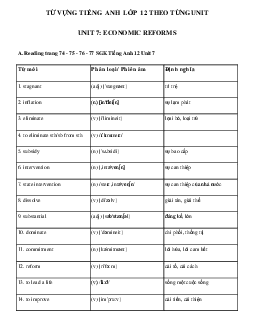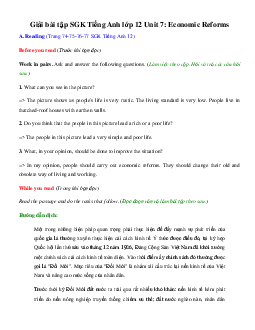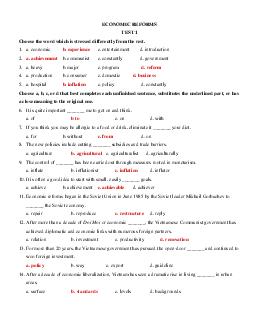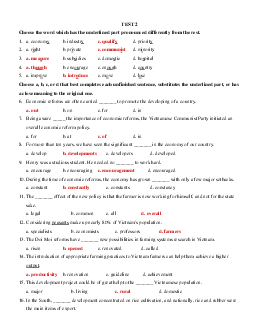




Preview text:
Bài ôn tập Tiếng Anh lớp 12 Unit 7, 8
Choose the word which has the underlined part pronounced differently from the rest. 1. a. machine b. change c. children d. lunch 2. a. reply b. safely c. quickly d. yearly 3. a. follow b. show c. allow d. slow 4. a. noisy b. Brazil c. lazy d. pizza 5. a. grown b. own c. known d. down
Choose a, b, c, or d that best completes each unfinished sentence, substitutes the underlined
part, or has a close meaning to the. original one.
6. He analyzed our country's economic problems profoundly. He must be a/an _______. a. fiction writer b. expert c. messenger d. scientist
7. We can take our photographs with a _______.
a. labor-saving device b. computer c. camera d. screen
8. Economic _______ are very necessary in a certain time to help develop a country. a. reforms b. transformations c. changes d. conversion
9. _______ refers to books and stories about imaginary people and events, rather than books about real people or events. a. Science b. Fiction c. Reference d. Dictionary
10. He ___ of being a famous journalist, but he is not really keen on learning. a. daydreams b. prepares c. chooses d. needs
11. I did not have enough lexical knowledge to _______ that article from Vietnamese into English. a. translate b. convert c. transmit d. reform
12. He fixed his eyes to the computer _______ without paying attention to what happened around. a. slide b. curtain c. layer d. screen
13. Those books are necessary for your thesis. They are really _______. a. inform b. information c. informer d. informative
14. The Japanese are _______ at lowering manufacturing costs. a. expert b. expertise c. expertly d. expertises
15. After a nature disaster, there is always an ____ need for food and water. a. urgent b. urge c. urgently d. urgency
16. I am still not accustomed _______ the weather in London. Except _______ weather, I like everything there. a. up/ over b. on/ with c. to/ for d. with/ from
17. I'll be ready to leave _______ about twenty minutes. Please come and pick me to the station. a. away/ toward b. in/ up c. for/ on d. at/ out
18. Computers have had a great effect _____ our lives since its appearance. a. on b. at c. for d. to
19. Don't keep shouting _______ me. I hate it. a. in b. for c. with d. at
20. What's the matter _______ you? You look pale and tired? a. on b. with c. for d. upon
21. We are tired _______ doing the same work day after day. a. of b. up c. for d. over
22. _______ the plane took off late, we still reached our destination on time. a. Though b. In spite c. Despite d. As though
23. He had a terrible cold _______ he insisted on going swimming. a. despite b. although c. in spite of d. but
24. _______ I became a millionaire, I would carryon working. a. Even though b. Despite of c. In spite d. Although that
25. _______, he managed to complete the race.
a. In spite he was severely hurt
b. Despite he was severely hurt
c. Even though being severely hurt d. Despite being severely hurt
26. In spite _______, we understood most of what he was saying.
a. of he was lisping b. his lisp
c. of his lisp d. he was lisping
27. Mary is ____ independent woman with ____ wise and ____ enthusiasm. a. an/ Ø/ Ø b. a/ the/ the c. the/ a/ an d. Ø/ a/ the
28. One of _______ students said, "_______ professor is late today." a. the/ A b. the/ The c. Ø/ A d. a/ Ø
29. Peter, likes to play ______ volleyball, but he is not _______ good player. a. the/ b. Ø/ a c. the/ the d. a/ the
30. My daughter is learning to play _______ violin at _______ school. a. the/ a b. a/ the c. the/ Ø d. Ø/ the
Choose the sentence which has the closest meaning to the original one.
31. Optimists believe that life will be far better than it is today.
a. Optimists cannot tell any differences between today life and future life.
b. It is believed by optimists that there will be no changes for life in the future.
c. Optimists believe that today's life is not as good as it will be.
d. Optimists believe that we will have a worse life in the future.
32. In spite of his poverty, he led a devoted life to the revolutionary cause.
a. He could not devote his life to the revolutionary cause because of his poverty.
b. If he had not been so poor, he could have devoted his life to the revolutionary cause.
c. Poor as he was, he leg a devoted life to the revolutionary cause.
d. He led a devoted life to the revolutionary cause, but he was so poor.
33. They did not let me in because I was not a member of the club.
a. They invited me although I was not a member of the club.
b. They did not allow me to enter because I was not a member of the club.
c. They invited me to the clubs as if I had been a member.
d. They asked me to get out of the club because I was not a member.
34. Can you account for your strange behavior?
a. Does your strange behavior make anybody surprised?
b. Can you please stop behaving strangely?
c. Can you give a good explanation for your strange behavior?'
d. Is your strange behavior only for me?
35. Most bosses cannot put up with irresponsibility.
a. Irresponsibility is what most bosses are trying to find.
b. Most bosses cannot tolerate irresponsibility.
c. Irresponsibility is a must to please most bosses.
d. Without responsibility, most bosses will not offer you a job.
Read the passage carefully and choose the correct answer.
Computer and telecommunications are already giving us access to large amounts of information.
They are increasing our brain power. As computers become more powerful they will grow more
intelligent. There seems no reason why machines should not become more intelligent than people in
the future. Computers will start to design and build other computers. They will then be able to evolve.
There will then be two forms of "life". Many thousands of years in the future there might be
competition for power between computers and life. Which will win?
Well, computers certainly have many advantages over life. They can
process large amounts of information quickly
be switched off for years, then start to work perfectly when they are switched back on
be made very small, and control tiny machines
work together in networks to solve big problems Furthermore
Electronics is much simpler than life's chemistry and does not need liquid water.
Unlike animals, which rely on plants to turn sunlight into chemical energy, semiconductors (the
material that" computers are made from) can turn sunlight directly into electricity.
When you compare computers to people the advantages are even more obvious
Computers do not have the instincts to fight which people seem to have.
It takes only a few seconds to load a program into a computer but years to educate a human.
When computers get out of date their information can be passed to new computers, but when
people get old and die all their knowledge is lost.
For all these reasons computers are believed to be more successful and important than life many
thousands of years in the future. It will be computers, not people, to colonize the other planets and
explore the Galaxy. Life will be left behind on Earth, as a treasured relic of where computers came
from. However it is possible that computers and life might merge to make anew, even more powerful form of intelligent being.
36. In the future, mankind and computers will have a serious war for survival. a. True b. False c. No information
37. A computer can design and build other ones. a. True b. False c. No information
38. Computers will have instincts to fight as human beings do. a. True b. False c. No information
39. If a computer has not been used for a long time, all data will lose. a. True b. False c. No information
40. Computers will explore the universe. a. True b. False c. No information
Fill in each numbered blank with one suitable word or phrase
If you think that life in. 2030 sounds unrealistic, consider this: how many people in 1985 thought
that computers and mobile phones could (41) _____ such a central role in our lives today or that
children would be gaming on the Internet. No one can accurately (42) _____ the future. One thing is
certain: the rapid change that we have seen since the 1980s will not slow down. It will speed (43)
_____ so much that, in some ways, our lives in 2030 will be unrecognizable today.
It is predicted that one billion people will be 65 (44) _____ older by 2030. Japanese scientists are
already developing robots to (45) _____ after the elderly and robots will be a permanent (46) _____
of everyday life all across Europe. People in 2030 will routinely reach the (47) _____ of 130. The
weather in 2030 is likely to be extreme, but the solution to the energy crisis will be to harness natural
clean energy sources, such (48) _____ solar, hydro, wind and geothermal. The internet will have
developed into a "super combined web" which is always on and always (49) ____. It is also explained
that some aspects of daily life in 2030 will seem very (50) _____ to today. We will still live in houses
and apartments, although they will be much more energy efficient. Children will still go to school, but
will be aided by virtual learning. 41. a. enjoy b. play c. take d. do 42. a. diagnose b. prefer c. tell d. predict 43. a. up b. on c. over d. above 44. a. and b. but c. or d. nor 45. a. look b. take c. follow d. run 46. a. human b. feature c. personality d. character 47. a. old b. elder c. aging d. age 48. a. as to b. as many as c. more d. as 49. a. contacted b. stuck
c. connected d. attached 50. a. familiar b. similar c. different d. fond



